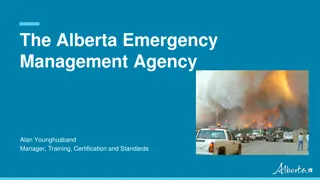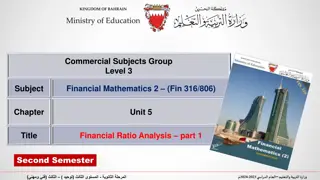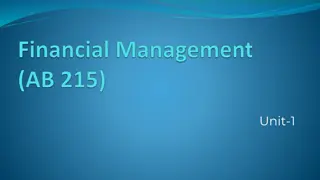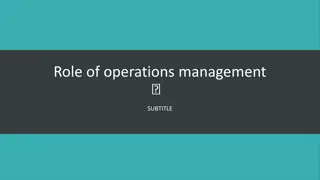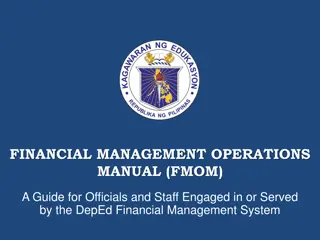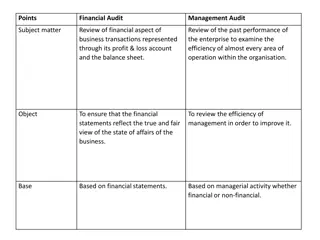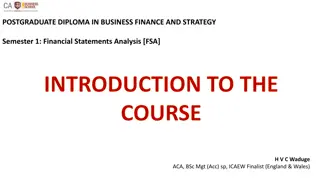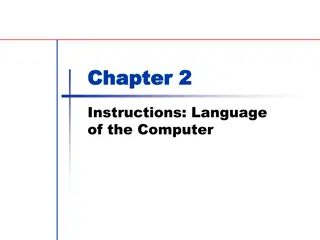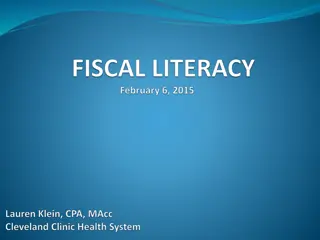Understanding Business Operations and Financial Management
Business operations involve day-to-day activities to generate profits, increase asset value, and secure income. Financial management comprises bookkeeping, accounting, and financial analysis for effective decision-making. Accountants and bookkeepers play crucial roles in providing financial guidance and ensuring accurate record-keeping. Cash flow statements are essential for managing finances effectively.
Download Presentation

Please find below an Image/Link to download the presentation.
The content on the website is provided AS IS for your information and personal use only. It may not be sold, licensed, or shared on other websites without obtaining consent from the author. Download presentation by click this link. If you encounter any issues during the download, it is possible that the publisher has removed the file from their server.
E N D
Presentation Transcript
Operations Franchisee Style
Business Operations what is it? Activities involved in the day to day functions of the business conducted for the purpose of generating profits. Business Operations encompass three things Generate a recurring income Increase the value of the business assets Secure the income and value of the business
What does Business Operations mean to you Bookkeeping PAYG WorkCover Invoicing Super Insurances BAS Quoting TAX Payments Phone calls Know, Like Trust Debtor follow- ups Banking Staff Management REVENUE! INCOME
Financial Management Financial Management consists of three process Bookkeeping - is the recording of financial transactions, and is part of the process of accounting in business.[1] Transactions include purchases, sales, receipts, and payments by an individual person or an organization/corporation. Accounting - This is the process of preparing budgets and financial statements (profit & loss statements, cash flow statements and balance sheets) from all of the bookkeeping information Financial Analysis The process of analysing and interpreting data against financial benchmarks and highlighting items of significance.
Who can help you Accountants (Tax Agent) can advise on much more than tax returns. They can help businesses make a range of decisions such as helping choose the right business structure, identifying growth goals and assisting with business improvement strategies. Importantly your accountant can also advise on taxation requirements (and update you on recent changes) as well as reporting requirements.
Who can help you A Bookkeeper (BAS Agent) helps record all financial transactions such as sales, purchases, banking, receipts and payments into accounting software and lodge BAS returns. They often assist with filing/scanning documents, checking, reconciling and budgeting. The bookkeeping function can be computerised. Many effective programs exist, such as MYOB, QuickBooks, Xero, Reckon and the JIMBO App that assists you in tracking transactions and scheduling jobs.
Cash Flow Statement A cash flow statement can be one of the most important tools in managing your finances. It tracks all the money flowing in and out of your business and can reveal payment cycles or seasonal trends that require additional cash to cover payments.
Business Related Expenses For The Month Jim s Fees Public liability insurance Phone / internet bills Chemicals Petrol Business Loan Car Insurance & Servicing $250 Staff / Super / Workcover $1000 $50 $60 $150 $350 $1870 Bank / credit card charges - $10
Personal Expenses For The Month Mortgage / Rent $2000 House insurance $80 Food Clothing Hair cuts Utility costs Doctors Bills School fees Kids activities $1300 $200 $50 $400 $40 $50 $200 $4720 Entertainment $400
Budget Health Check Result Combined business plus personal requirement $6590.00 (NEED TO EARN) Total amount of income forecast $8000.00 $8000 / 11 = $727.27 GST Actual Revenue = $7272 $7272 - $6590 = $682.00 SAVED FOR PAYG NO YOUR NUMBER!
Business Planning Daily Business Planning FORTUNE $400 Days 1) Regular Clean $99 2)Clean once $110 3)Oven Clean $100 4)Regular $120
Business Planning A business plan is essential for the success of any business A business plan provides direction, keeps you on track and is usually a requirement when you seek finance. Review, Review & Review Business planning is an ongoing business activity. As your business changes many of the strategies in your plan will need to evolve to ensure you business is still heading in the right direction. Having your plan up to date can keep you focussed on where you are heading and ensure you are ready when you need it again.
BANKING 1. Business Account Will have debit card attached to it 2. Reserve Account For business only 3. Personal Bank account This is for your wage goes!
Operational Checklist Daily Weekly Monthly Schedule your work for day/week Follow-up leads (within 2hrs) Bank Cash Collect and store all receipts Ring your regular customers Follow up Quotes Follow up outstanding invoices Weekly bank reconciliation Wages staff Ezy Rental Payments Bank Cash Pay Franchise Fees Monthly Bank Reconciliation Pay Super (both for yourself and employees) Pay Suppliers Send Receipts to Bookkeeper Pay for Premium Funding (Jims Insurance) Pay car Leases Prepare P & L Great idea to complete every month to monitor your expenses/profit Also to discuss with accountant/bookkeeper
Operational Checklist Quarterly Annually Pay WorkCover Bill If you have employees Prepare & Lodge BAS Pay BAS Re- Look at your Business Plan Send out Quarterly Newsletter Prepare P & L for tax TAX Make time with accountant to discuss year and also planning for the next year (Tax Planning) Car/Trailer Rego/s Annual catch-up with key business people Business Planning Review and amend if necessary Re-new insurances and send out certificates etc. to suppliers
WorkCover / Worksafe What is it If you are going to employee someone in your business REMEMBER every state has different policies and procedures check with the relevant WorkCover body to confirm what is required. E.g. NSW & Vic both indicate the following If you're an employer who pays $7500 or less in annual wages, you don't employ an apprentice or trainee and you are not a member of a group for premium purposes, then you're not required to get an insurance policy. Premiums You have the ability to pay your WorkCover premiums quarterly or yearly
REGULATORY REQUIREMENTS Keeping up-to-date with the lodgement and payment of your statutory obligations is considered an important measure of the health of your business by banks, other creditors and potential investors. Therefore, we suggest diarising the lodgement and payment due dates for each of the requirements. REGULATORY REQUIREMENTS CHECKLIST (copied from the CPA Australia) REGULATORY REQUIREMENTS CHECKLIST (copied from the CPA Australia) Income tax return Provide Information, including financial statements to your accountant for review. Business Activity Statement (BAS) If you have difficulties with our BAS talk to your accountant/bookkeeper. Or engage a bookkeeper/accountant to complete Australian Securities and Investments Commission annual report (companies only) Ask your accountant to prepare this PAYG withholding payment summary annual report If you have full/part time employees you need to provide a PAYG statement end of financial year Payroll Tax Talk to your accountant if you are unsure whether you have a payroll tax obligation Workers Compensation insurance Talk to WorkCover/accountant Determine your projected wages and salaries for the year Superannuation Pay Monthly or when you do your pay run Staff salaries and awards conditions Review staff salaries and conditions to ensure compliance with awards (where appropriate) and other legal requirements. Government grants If you are in receipt of government grants, ensure you meet your reporting obligations under the grant.
Questions If you are not registered for GST do I have to lodge a BAS statement? Who can lodge a BAS statement Me, bookkeeper, accountant, all of the above What does a profit and loss spreadsheet show? What is my breakeven point? (What do I have to earn in a minutes/hour, day or month) When is the best time to do your bank reconciliations on your account/s? Daily, monthly, quarterly, six monthly or annually WorkCover Do I have to register for WorkCover YES NO only if I hire someone








